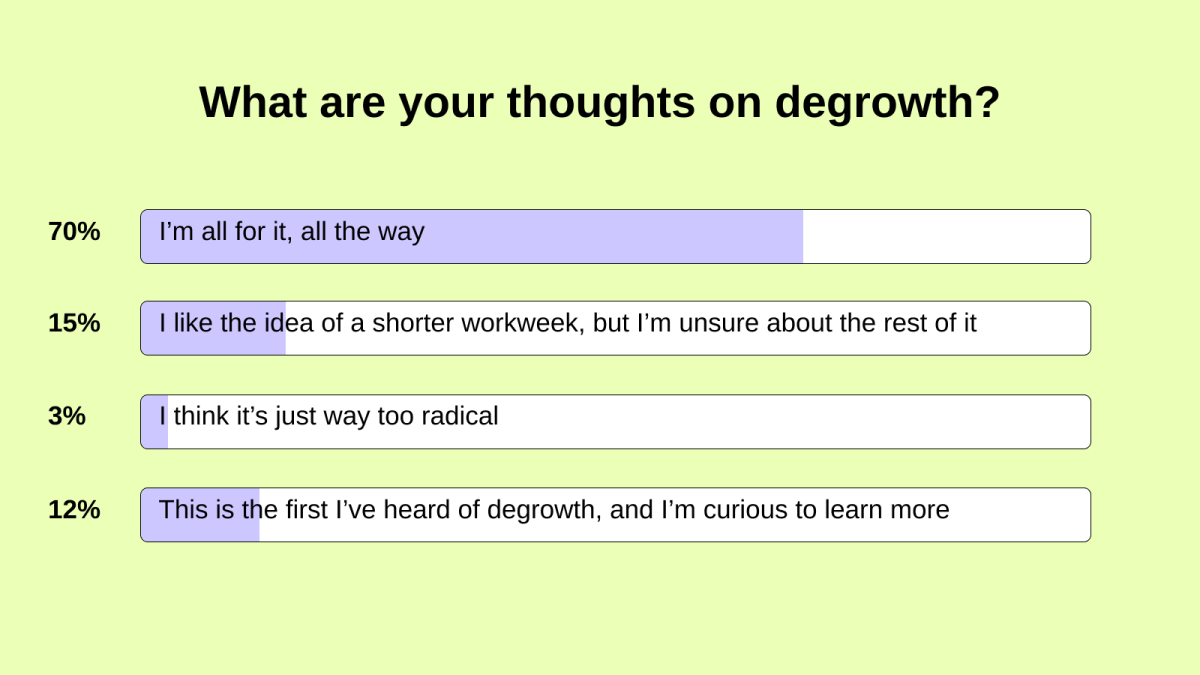
The spotlight
Hey there, fam. If you subscribe to this newsletter, you probably believe in the importance of storytelling about climate solutions and the people leading them. And also, as a loyal subscriber, you probably heard from Grist earlier this week that we are actively seeking nominations for the 2024 Grist 50 — our annual list of climate changemakers to watch.
The Grist 50 is one of Grist’s flagship projects, showcasing solutions and solution-eers. Collectively, the 50 stories on each year’s list show what a vibrant, diverse climate movement looks like, and how everyone has a place in it. (It’s also a particularly meaningful project for me personally, because I’ve worked on it for the past five years. Since my intern days!)
In today’s newsletter, we’ve gathered some of the standout nominations that helped us compile last year’s Grist 50 list. Reading the stories and kind words that people share through these nominations is one of the reasons I love working on the Grist 50. I hope you’ll find inspiration in them as well — and also, perhaps, motivation to think about someone you might want to nominate for this year’s list.
I would love nothing more than to hear about the climate work that inspires you, and who’s leading it. They could be people you’ve worked with, people you’re friends with, people you’ve read about. They could even be YOU!
The stories that don’t make it onto the final list of 50 often wind up percolating into ideas for future coverage, including here in this newsletter. So please, give it a think and tell me about somebody (or multiple somebodies) whose story of climate leadership deserves to be told.
Or, just enjoy the passion in the nominations gathered here. They have been lightly edited and condensed for clarity.
— Claire Elise Thompson
![]()
Sarah Lazarovic, head of communications at Rewiring America, nominated her then-colleague Sam Calisch:

Sam Calisch is an MIT-trained Ph.D. But he’s also a human heat pump! My wonderful colleague at Rewiring America gamely donned a heat pump costume that he had designed to shoot a series of heat pump documentaries in our nation’s capital, interviewing a handful of senators and generating a ton of interest in this cool, hot tech.
Of course, this was the funny part of Sam’s work to help implement world-changing climate policy. Behind the scenes, Sam is a force of data — brilliantly synthesizing what’s happening in our energy systems to put forth the most compelling policy. It’s no exaggeration to say he played an essential role in shaping and improving some of the key clean tech provisions in the Inflation Reduction Act.
Sam is always thinking of the most novel and innovative ways to help households electrify, and this extends to brilliant home electrification inventions like an induction stove that is about to come to market. He is a force of electric innovation and brilliance, lifting up new ideas, and always finding creative ways to share the research and data needed to inform good policy and meaningful emissions reduction. And he looks good in tights.
![]()
Cam Rodriguez, a data journalist at the Illinois Answers Project, nominated her mom, Joanne Rodriguez:

After spending a miserably long amount of time in the roofing/construction manufacturing sector, Joanne launched a startup, Mycocycle, which utilizes mycoremediation and the innate processes of nature to break down heavy metals, toxins, and PFAS from discarded building and industrial materials to create a remediated byproduct that can then be used as its own product.
I’ve watched Joanne, who has always been involved with sustainability and improving our community, go from concept to application over the past five years, and it’s been a remarkable and truly awesome thing to witness; her interest in this — true sustainability and environmental justice — goes so much deeper than just a business. She’s advocated for warehouse workers in our now shipping-and-logistics-heavy county, speaking out about the impact of warehousing on the environment with regard to polluted runoff and byproducts, and worked to educate and engage people where her work takes place, as well as hold those in power accountable for their role in pollution and the potential for them to be involved in a circular economic model without contaminating their communities.
![]()
Caitlin M Caplinger, storytelling manager at the Institute for Market Transformation (and a Looking Forward reader!) nominated their colleague, Precious Rideout:

Precious built the community engagement work at IMT and is laying the groundwork for equitable, community-led and -owned building decarbonization throughout the country. She is working from a justice lens to ensure that communities are informed, resourced, and driving the building performance standard policies that are passing in cities, counties, and states. Buildings are a huge contributor to emissions, and an important sector to push for change. I’m inspired by her background, and her using that experience to fight the climate crisis. Her work with frontline communities in education and providing resources is the way that we will make progress — putting power in the people.
Recently, she worked with Poder Latinx and the City of Orlando to co-develop their building performance standard policy.
She has helped conceptualize a new initiative called Community Climate Shift that will help direct hundreds of thousands of dollars and technical resources to communities as they work with jurisdictions to co-create climate policies for buildings.
![]()
Joel Seidner, a program manager at Eastie Farm, nominated his executive director, Kannan Thiruvengadam:

Kannan does not stay in a single lane. He works across silos. He believes you can only solve systemic issues in holistic ways. His activism includes food, urban design, and education, all toward creating benefits for people in the here and now and engaging them in beginning to solve bigger and longer-term challenges like climate change.
What inspires me is the tenacity with which he creates spaces for people to engage together in solving problems. He doesn’t believe in Band-Aids. He [gives] relief to issues by solving them from the root to eliminate the issue entirely. His impact can be measured in two ways: One, other community leaders rely on him for support in their work (which means he has already established credibility by solving problems). And two, he has created 20 green jobs within Eastie Farm; seven green, open, community food-growing spaces; and several high-impact coalitions where organizations and individuals work together. Via Eastie Farm he has been feeding healthy produce to more than 600 low-income families, eliminating stigma in food insecurity through an innovative integrated CSA program, providing income to local small farmers, and designing educational programs in schools that will create future climate leaders.
![]()
Samantha Grassle, a program director at the climate tech incubator Elemental Excelerator, nominated a founder whose work she advised, Tanya Barham:

Tanya is the Founder and CEO of Community Energy Labs — a company that builds simple, affordable energy-management technologies for community buildings such as schools, universities, and government buildings. Many of these buildings have increasingly complex and expensive energy needs that can keep decarbonization out of reach. With its AI-powered, grid-interactive control system, Community Energy Labs is ushering in a future of clean, all-electric, self-operating buildings.
I am inspired by Tanya’s commitment to work on clean energy needs in education and I have learned from her that schools spend more on energy than they do on textbooks and tech combined. She is solving a critical problem and is poised to have an enormous impact for cost savings in high-need schools and building decarbonization.
See for yourself
Now it’s your turn! Use this nomination form to tell us a story about an innovative climate leader you think deserves to be featured on the 2024 Grist 50.
A parting shot
In last week’s newsletter, we asked y’all to share your thoughts on the concept of degrowth. The results are in: A vast majority (70 percent) of you shared that you are pretty darn stoked about the idea. Fifteen percent said that they were interested in the four-day workweek, but not sure about other degrowth policies, and 12 percent said that they were new to the topic and curious to learn more. We will keep that in mind for future story possibilities!



